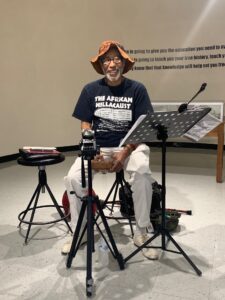
Photo by Rikki Bell
Samuel Olusegun Williams talked about the struggle for Kijuchagulia in the African diaspora during a Saturday presentation at the Foster-Tanner building. Williams hosted an enlightening hour of storytelling, songs and poems of self-determination of people of the African diaspora.
The second principle in Kwanzaa is Kijchagulia , in Swahili. It means self-determination. Kwanzaa is a 1-week festival for the purpose of honoring African culture and tradition. In the United States, this holiday is celebrated every year from Dec. 26 to Jan. 1.
Kijchagulia symbolizes the fight to work hard and overcome discrimination and adversity in everyday life. The creator and founder of Kwanzaa, Maulana Karenga, defines Kijuchagulia as controlling your own destiny, and not allowing external forces to define, create or speak for someone. Kijchagulia is rooted in Afrocentricity and the cultural image and human interest of African people.
“I knew that Kijchagulia was a part of Kwanzaa but I did not know the philosophy behind it. Growing up, I did not celebrate Kwanzaa. This information about Kijchagulia is important and makes me analyze my culture and who I am. I’m interested in researching and learning about the other principles: Umoja, Ujima, Ujamaa, Nia, Kuumba and Imani,” said Jada Gadson, a FAMU student.
Self-determination is the quest to answer the questions “Who am I?, Am I really who I am?” and “Am I all I ought to be?”
To answer these questions, apply the ethical and cultural standards regarding the nature of the idea and practice with regards to what identity is and should progress toward becoming in both an African and human sense. Kijchagulia is a right and responsibility to exist as people and make a unique contribution to the forward glow of human history.
Williams is an educator, historian and performing artist. In 1988, he brought the first djembe drum to Tallahassee and launched a tradition of music and dances from the Sene-Gambia of West Africa, which is still an essential part of Tallahassee’s Afrocentric community to this day. He was a member of a very popular ’90s reggae band, Phoenix Uprising, which was selected for the Bob Marley Tour in 1994. Williams traveled a lot, researching and gathering history, music and folklore from the African diaspora. His goal is to share the richness of Africa and its diaspora through history and the performing and visual arts.
“I got together with another drummer, and with our knowledge of African folktales. I wanted to use African folktales to promote African culture and influence the kids. We put together a duo, but he eventually dropped out and I carried on because I enjoy the history and traditions of African culture,” Williams said.
Williams will continue to spread African culture to the youth and share his knowledge through lectures, demonstrations and performances for all ages.
“We hear about these impacts on different countries but It hits closer when you can hear stories from historians, leaders in Tallahassee about sustaining the philosophy of Kijuchagulia (self-determination). We need that connection,” said Aja Roache, Foster-Tanner Fine Arts gallery director.